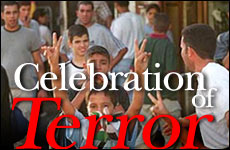 Iran’s Attack on Israel
Iran’s Attack on Israel


3 min read
7 min read
4 min read
4 min read
When Palestinians celebrate terror attacks, the media is strong-armed into suppressing its coverage. Here's why.
It's been a tough year for Israel in the media. A slew of accusations were leveled against the Jewish state: "excessive force," "escalation," and "indiscriminate killings." It almost seems as if media coverage of the conflict was inherently skewed.
In many cases it is.
Foreign journalists aren't free to just walk into Gaza and start snapping pictures. As a result, Israeli media expert Ehud Ya'ari says that 95 percent of the photos and videos coming out of the territories are provided by Palestinian freelancers. These crews obviously identify emotionally and politically with the intifada and, in the best case, simply don't dare film anything that could embarrass the Palestinian Authority.
95 percent of the photos and videos coming out of the territories are provided by Palestinian freelancers.
The problem was never more evident than in these days following the terror attacks on New York and Washington. Upon hearing the news, Palestinians in Beirut, Nablus and eastern Jerusalem exploded in street celebrations -- rejoicing, dancing and handing out candies.
Then, to prevent the world from seeing these incriminating images, armed Palestinians -- some in uniform -- trapped photojournalists inside a Nablus hotel while festivities continued in the streets. One cameraman on assignment for Associated Press Television News was summoned to a Palestinian Authority security office and told that his video footage must not be aired. Ahmed Abdel Rahman, Arafat's cabinet secretary, threatened that if the footage is broadcast, the PA "cannot guarantee the life" of the cameraman.
Other networks said that the PA threatened to revoke their entry permits into Palestinian Autonomous areas.
At the moment that freedom was under attack in America, this different strain of terror was at work in the West Bank. The tactics were different, but the goal was the same: assail the bastions of freedom.
At the moment that freedom was under attack in America, a different strain of terror was at work in the West Bank.
The scene was repeated three days after the attacks, when 1,500 Palestinians demonstrated in Gaza by waving posters of Osama bin Laden. Again, Palestinian police detained foreign journalists and confiscated videotape, film and other camera equipment.
In protest, the Foreign Press Association (FPA), representing hundreds of mainstream journalists in Israel, declared:
"The FPA expresses deep concern over the harassment of journalists by the Palestinian Authority as police forces and armed gunmen tried to prevent photo and video coverage of Tuesday's rally in Nablus where hundreds of Palestinians celebrated the terror attacks in N.Y. and Washington. We strongly condemn... Palestinian officials who made no effort to counter the threats, control the situation, or to guarantee the safety of the journalists and the freedom of the press."
None of this is new. Freedom House, the human rights group, reports: "Under a 1995 Palestinian press law, journalists may be fined and jailed, and newspapers closed, for publishing 'secret information' on Palestinian security forces or news that might harm national unity or incite violence."
The threat is real. In November 2000, the Palestinian Journalists' Union published a letter in the Palestinian daily "Al Hayat," condemning the Associated Press for its portrayal of the "struggle of the Palestinians," and threatening that if AP did not change its coverage, the Palestinian Journalists' Union would adopt "all necessary measures against AP staffers."
How can a journalist report honestly if his life is threatened?
How can a journalist report honestly if his life is threatened?
All this evokes haunting memories of the Palestinian reign of terror in West Beirut, where a half-dozen journalists were killed by the PLO.
No wonder so many news agencies have complied with Palestinian demands to censor the celebration scenes -- as they have undoubtedly done on other occasions throughout the past year.
But let us be clear: We must not capitulate. When terror strikes at freedom, the proper response is to strengthen freedom. Join a media watch group. Demand that news agencies publicize these images. By doing so, it will send a message to all terrorist thugs that, despite violence and intimidation, freedom will surely prevail.
